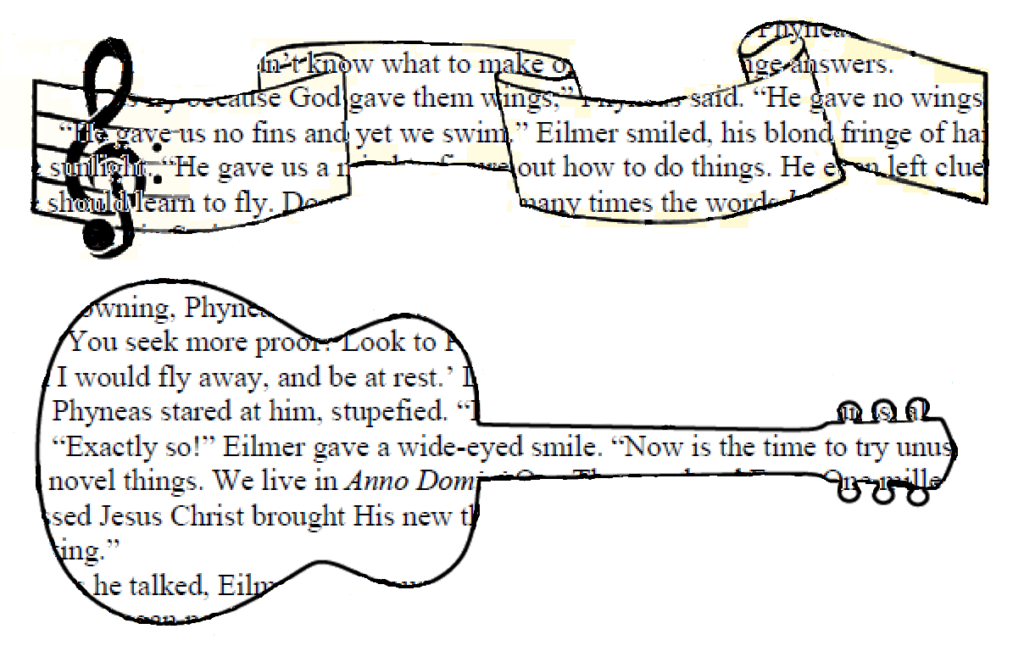Many songs tell stories. Can our musical counterparts—songwriters—teach a few things to prose fiction writers like us?

Many songs, perhaps most, just convey a mood or a thought. Today I’m only considering ‘story songs’ and I’ll define them as tunes having (1) one character with a problem, (2) a plot where the character struggles to solve the problem, and (3) an ending where, as a result of the character’s actions, the problem is resolved. That’s the definition of a story, too.
Songwriters have a few advantages over story-writers. They can:
- set the mood of the story with the tune and instruments alone;
- use melody, rhythm, and the tone of their singing voice to convey emotions and the up-and-down cycling of tension;
- use pauses to delay a surprise ending until the time is right; and
- can repeat phrases (say, in a chorus) without the listening audience getting bored by the repetition.
By contrast, story-writers must convey their tale using words alone.
On the other hand, songwriters operate under a couple of constraints not faced by story-writers. They must tell their story in a very short time (typically four to ten minutes), and most often they must do so in poetic rhyme. Due to the brevity of story songs, many of them resemble flash fiction stories, those with 1000 words or less.
From what I’ve gleaned in my research, story songs are more prevalent in country music and folk songs than in other musical genres. Also, certain singers are more drawn to story songs than others. Examples include Harry Chapin (“Taxi,” “Cats in the Cradle,” and “Flowers are Red”) and Johnny Cash (“A Boy Named Sue” and “One Piece at a Time”).
Story songs tend to be somber, dark, or even tragic in tone and message. There are some humorous ones, such as Meatloaf’s “Paradise by the Dashboard Light” and upbeat ones like “Devil Went Down to Georgia” by The Charlie Daniels Band, but these are exceptions.
Often, like most songs, story songs tend to involve young love, or lost love. Further, they tend to be about ordinary people, poor or middle-class people with troubles.
What can story-writers learn from songwriters?
- Set the scene with a few well-chosen words. Don’t start with backstory—you can fill that in later. In “Puff the Magic Dragon” by Peter, Paul and Mary, we’re only told the dragon lived ‘by the sea, and frolicked in the autumn mist in a land called Honahlee.’
- Introduce your main character early, and make that character compelling, someone with whom readers will identify. In Barry Manilow’s “Copacabana,” we are drawn to Lola, not because she’s a showgirl with yellow flowers in her hair, but because she and Tony ‘were young and had each other, who could ask for more?’
- Early on, force your character to face a difficult conflict, one that’s serious and will drive the plot. The very first lines of “Coward of the County” by Kenny Rogers are, ‘Everyone considered him the coward of the county,’ setting up an inevitable test of manhood. In “Stan” by Eminem, the narrator establishes early that he’s got an irrational obsession, a hero fixation that is messing up his life.
- Choose a few key details to describe things. There’s no need for complete descriptions. “Hotel California” by The Eagles is masterful, giving us mental images such as cool winds, warm smell of colitas, hearing the mission bell, lighting of a candle, etc. The song zeros in to give precise details about a few things, and listeners fill in the gaps.
- Resolve the conflict in a way that the character learns something, perhaps something unexpected. In “Margaritaville” by Jimmy Buffett, the song’s chorus keeps changing as the narrator learns who’s really to blame for his troubles. In “Fast Car” by Tracy Chapman, the narrator thought a man with a fast car would drive her to a better life, but in the end tells him to ‘take your fast car and keep on driving.’
- Story ideas. Take your favorite song and convert it into a story. Twist it enough so you don’t violate its copyright, but you can channel the same emotions inspired by the song into your story.
About now, one of the songs I mentioned is stuck in your head, right? I better quit, since you’re busy humming a tune and no longer reading words written by—
Poseidon’s Scribe
